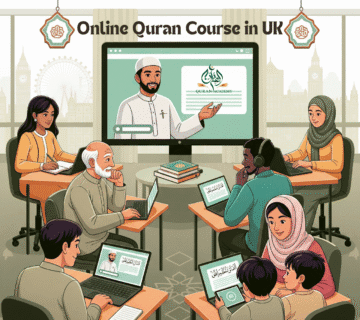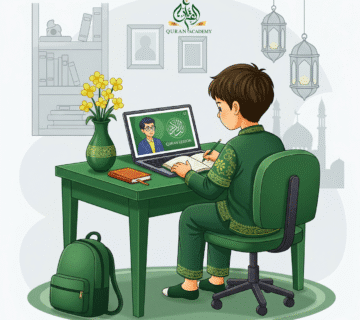Explaining Islam to a child is a beautiful and ongoing process that should be tailored to their age, curiosity, and understanding. The goal is to instill love for Allah, the Prophet Muhammad (peace be upon him), and Islam, rather than simply listing rules. Here’s a comprehensive guide:
I. Core Principles for Explaining to Children:
- Start with Love (الحب): Emphasize Allah’s love for us, His mercy, and His blessings. Make Islam feel like a source of comfort, joy, and kindness, not just rules.
- Keep it Simple and Age-Appropriate: Avoid complex theological terms or abstract concepts initially. Use analogies they can relate to.
- Be Positive and Enthusiastic: Your own attitude about Islam will be contagious.
- Answer Their Questions Honestly: If you don’t know an answer, admit it and promise to find out.
- Lead by Example (القدوة الحسنة): Children learn more from what they see you do than what you say. Let them observe your practices and Akhlaq (good character).
- Make it Fun and Interactive: Incorporate stories, songs, games, and crafts.
- Consistency Over Intensity: Short, regular conversations are better than long, overwhelming lectures.
- Focus on Connection, Not Perfection: The goal is to build their relationship with Allah and His religion, not for them to be perfect in practice immediately.
II. Key Concepts to Introduce (and How):
A. Allah (God) – الله:
- Who is Allah?
- “Allah is our Creator. He made everything beautiful around us: the sun, the moon, the trees, you, me, and all the animals!” (Point to creation around them).
- “Allah is All-Loving (Ar-Rahman, Ar-Rahim). He always cares for us and gives us everything we need.”
- “Allah is One. There’s only one God, and He’s the best.”
- “Allah knows everything and sees everything, even what’s in our hearts. So He knows when we try our best.”
- How to Connect with Allah:
- “We talk to Allah when we make Dua (pray with words from our heart). We can ask Him for anything we need, thank Him, or just tell Him we love Him.”
- “We remember Allah by saying ‘Alhamdulillah‘ (Praise be to Allah) when something good happens, or ‘Insha’Allah’ (God willing) when we plan something.”
- “Allah wants us to be kind and good, just like He is kind and good to us.”
B. Prophet Muhammad (PBUH) – النبي محمد صلى الله عليه وسلم:
- Who is the Prophet?
- “Prophet Muhammad was a very special person sent by Allah. He taught us how to be good Muslims and how to live a happy life that Allah loves.”
- “He was very kind, honest, and loved everyone. He always helped people and never got angry easily.”
- His Message:
- “He brought us the Quran (the Holy Book) from Allah.”
- “He showed us how to pray, how to be fair, and how to treat everyone with respect.”
- How to Show Love for the Prophet:
- “We say ‘Peace be upon him’ (Sallallahu alaihi wa sallam) whenever we say his name. It’s like sending him a special greeting.”
- “We try to be like him by being kind, sharing, and helping others.”
- Tell simple stories from his life (Seerah) that highlight his character (e.g., how he treated animals, helped the poor, his patience).
C. The Quran – القرآن الكريم:
- What is the Quran?
- “The Quran is Allah’s special book. It’s like a letter from Allah to us, telling us how to live and what makes Him happy.”
- “It has beautiful stories and lessons for us.”
- How to Interact with the Quran:
- Show them your Mushaf (copy of the Quran). Let them touch it with respect.
- Play recitations of short, familiar Surahs (chapters) like Al-Fatiha or Al-Ikhlas.
- Teach them very simple verses or phrases.
- Tell them stories from the Quran in an engaging way (e.g., Prophet Yusuf, Prophet Musa, Prophet Nuh).
D. The Five Pillars of Islam – أركان الإسلام الخمسة:
Introduce these as the “five special things Muslims do to show Allah they love Him.”
- Shahada (The Declaration of Faith – الشهادة):
- “This is saying from our hearts that there is only one God, Allah, and Prophet Muhammad is His messenger.”
- “It’s like a promise to Allah.”
- Salah (Prayer – الصلاة):
- “We pray five times a day to talk to Allah and thank Him. It’s our special time with Him.”
- Let them observe you praying. Provide them with a small prayer mat and allow them to imitate you, even if they’re just mimicking movements. Don’t force them initially.
- Teach them very simple movements and perhaps “Allahu Akbar” and “SubhanAllah.”
- Zakat (Charity – الزكاة):
- “Allah asks us to share some of what we have with people who need help, like giving money to the poor or toys to children who don’t have any.”
- Involve them in small acts of charity (e.g., donating old toys, putting coins in a charity box).
- Sawm (Fasting – الصيام):
- “During Ramadan, a special month, big Muslims don’t eat or drink from sunrise to sunset to feel closer to Allah and to remember those who are hungry.”
- For very young children, they can “fast” for a few hours. Focus on the concept of gratitude and empathy.
- Hajj (Pilgrimage – الحج):
- “Once in their life, if they can, big Muslims go to a very special place called the Kaaba in Mecca to visit Allah’s house and pray with many, many other Muslims from all over the world.”
- Show them pictures or videos of the Kaaba and people performing Hajj.
E. Good Manners (Akhlaq – الأخلاق) and Actions:
- Kindness: “Islam teaches us to be kind to everyone: our family, friends, neighbors, even animals.”
- Honesty: “Always tell the truth, even if it’s hard.”
- Sharing: “Allah loves it when we share what we have.”
- Respect: “Respect our elders, parents, and teachers.”
- Gratitude: “Always say ‘Alhamdulillah’ (Praise be to Allah) for everything good.”
- Patience: “If something is difficult, we try to be patient.”
III. Practical Tips and Activities:
- Storytelling: Read Islamic children’s books, tell Jataka stories, or simply make up stories about kindness, sharing, and honesty.
- Songs/Nasheeds: Use Islamic children’s songs that teach basic concepts.
- Crafts: Make simple crafts related to Islamic themes (e.g., a crescent moon, a prayer mat drawing, decorating a charity box).
- Play-acting: Let them pretend to pray or do Wudu.
- Mosque Visits: Take them to the mosque. Show them the prayer hall, library, or children’s area. Make it a positive experience.
- Simple Games: Create memory games with Islamic terms or picture cards.
- Celebrate Eid: Make Eid holidays truly special and joyful experiences for them.
- Answer “Why?” When they ask “Why do we pray?” or “Why do we fast?”, give simple, meaningful answers.
IV. What to Avoid:
- Fear-mongering: Never use scare tactics (e.g., “Allah will put you in hell if you don’t pray”). Focus on love and reward.
- Overwhelm: Don’t present too much information at once.
- Shaming or Scolding: Don’t shame them for not doing something correctly or for making mistakes. Encourage their effort.
- Comparing: Never compare them to other children (“Why can’t you pray like so-and-so?”).
- Complex Debates: Shield them from complex theological debates or political issues until they are much older.
What is Islam and who are Muslims?
Islam is a religion followed by Muslims.
It is based on the belief in one God, Allah, and the teachings of the Prophet Muhammad.
Muslims follow the holy book of Islam, the Quran, and the five pillars of Islam, including praying five times a day and giving to charity.
Muslims believe in peace, compassion, and kindness towards others.
They also fast during the month of Ramadan and strive to make a pilgrimage to Mecca at least once in their lifetime.
Overall, Islam promotes love, respect, and understanding among people, regardless of their background or beliefs.
Muslims are individuals who practice the religion of Islam.
They come from various cultures, backgrounds, and nationalities but share the common belief in the teachings of Islam.
Muslims strive to live their lives according to the values and principles outlined in the Quran and the teachings of Prophet Muhammad.
How can I introduce Islamic beliefs to children?
Islam for children involves introducing Islamic beliefs in a simple and understandable manner.
Here are some tips to help you explain the Muslim religion to kids:
- Use Stories and Examples: Share stories from the Quran and Hadith that highlight moral values and virtues like kindness, honesty, and generosity.
- Encourage Questions: Create an open environment where children feel comfortable asking questions about Islam and its practices.
- Lead by Example: Be a role model by demonstrating Islamic principles through your actions and behavior.
- Involve Them in Practices: Engage children in simple Islamic rituals like fasting during Ramadan or giving to charity.
- Make Learning Fun: Use games, crafts, and activities to teach children about Islam in an enjoyable and interactive way.
By following these strategies, you can effectively introduce Islamic beliefs to children and help them develop a deeper understanding and appreciation for the religion.
What are some engaging ways to teach kids Islamic practices?
Engaging Ways to Teach Kids Islamic Practices
To make learning about Islam enjoyable for kids, consider incorporating interactive methods:
- Arts and Crafts: Encourage creativity by making Islamic-themed crafts like lanterns for Ramadan.
- Games: Create Islamic trivia quizzes or scavenger hunts to make learning fun.
- Role-Playing: Act out daily prayers or rituals to help kids understand their significance.
- Technology: Use educational apps or videos to supplement traditional teachings.
- Cooking: Prepare simple Islamic recipes together to learn about halal food practices.
By making Islamic education interactive and fun, kids are more likely to engage with and retain the teachings, fostering a love for their religion from a young age.
Can you recommend age-appropriate stories from Islamic history for kids?
Age-Appropriate Islamic History Stories for Kids
If you’re looking to introduce children to Islamic history in an engaging way, there are several age-appropriate stories that can capture their imagination and teach them valuable lessons.
Stories like the “Story of the Prophet Muhammad (pbuh)” can help kids understand the beginnings of Islam and the Prophet’s teachings.
Another popular tale is “The Story of The Prophet Ibrahim (AS)”, which teaches children about the importance of faith and obedience.
Additionally, “The Story of Prophet Yusuf (AS)” is a captivating narrative that highlights the themes of patience and forgiveness.
These stories not only entertain children but also instill important moral values, making learning about Islam an enjoyable experience for kids.
By incorporating these tales into their reading, kids can gain a deeper understanding of the rich history and teachings of Islam.
How should I respond to common questions kids may have about Islam?
How to Explain Muslim Religion to a Child?
To explain Islam to kids, start by highlighting that Islam is a peaceful religion followed by millions worldwide.
Share that Muslims pray, read the Quran, and fast during Ramadan.
Emphasize the importance of kindness, honesty, and respect in Islam.
Use simple language and relatable examples to explain concepts like Allah, prophets, and prayer.
Encourage questions and discussions to help children understand better.
Address common queries such as why Muslims pray five times a day, why women wear hijabs, or why Ramadan is celebrated.
Teaching acceptance and tolerance towards different beliefs is key.
By fostering an open, understanding environment, children can learn about Islam in a positive and inclusive way.
Conclusion
In conclusion, explaining Islam to kids is crucial to fostering understanding and respect for diverse beliefs from a young age.
By introducing children to the basic principles of Islam in a simple and engaging manner, we can promote tolerance and empathy in our future generation.
Through this article on “How to Explain Muslim Religion to a Child?
“, we have highlighted the significance of creating a safe space for children to ask questions, learn about different cultures, and appreciate the beauty of diversity.
Parents and educators play a pivotal role in shaping children’s perceptions of the world, and by incorporating discussions about Islam for children, we can promote inclusivity and mutual understanding.
So, let’s embrace the opportunity to educate kids about Islam with compassion and openness.
JOIN US NOW and get a free trial





Attractive section of content. I simply stumbled upon your weblog and in accession capital to say that I get in fact loved account your weblog posts. Anyway I will be subscribing in your augment and even I achievement you get right of entry to consistently quickly.
I gotta favorite this internet site it seems very helpful very useful